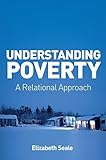Understanding Poverty : A Relational Approach / Elizabeth seale.
Material type: TextPublisher: Cambridge ; Hoboken, NJ : Polity, 2023Copyright date: ©2023Description: viii, 234 pages ; 23 cmContent type:
TextPublisher: Cambridge ; Hoboken, NJ : Polity, 2023Copyright date: ©2023Description: viii, 234 pages ; 23 cmContent type: - text
- unmediated
- volume
- 9781509553327
- 9781509553334
- 339.46 23 SEA-U 1630
- HC110.P6 S43 2023
| Item type | Current library | Collection | Call number | Status | Barcode | |
|---|---|---|---|---|---|---|
 Books
Books
|
PIPS Library | NFIC | 339.46 SEA-U 1630 (Browse shelf(Opens below)) | Available | 1630 |
Browsing PIPS Library shelves Close shelf browser (Hides shelf browser)

|

|

|

|
No cover image available |

|

|
||
| 338.95491 ISH-G Globalization, Governance and Growth | 338.954918 ISH-E 1584 The Economy of modern Sindh: Opportunities Lost and Lessons for the Future / | 339.3 COY-G 448(D) GDP : A Brief but Affectionate History / | 339.46 SEA-U 1630 Understanding Poverty : A Relational Approach / | 340.0954 SHA-P 1589 The Pakistan Penal code, XLV of 1860: Sections 304-Index | 340.59 340.59 IFA-I (D) Islamic Labour Code English Based on our understanding of the Quran and Sunnah | 340.59 ALH-I 1498 Islamic Jurisprudence Tradition of the Holy Prophet |
Includes bibliographical references (pages 189-221) and index.
People in poverty suffer daily under misconceptions about economic hardship and its causes. Providing the most comprehensive consideration to date of poverty in the United States, Elizabeth Sealse tackles how we think about issues of culture, behavior, and poverty, cutting straight to the heart of debates about social class. The book addresses tough questions, including how being poor affects individual behavior, and how we can make sense of that in a larger social and political context. The central premise is that to understand the behavior and lives of people in poverty, one must consider their relational context, especially relations of vulerability and the human need for dignity. Poverty is a social problem we should address as a society by changing social relations that, as a matter of course, cause unnecessary and immense suffering. To do so, we must directly confront our lack of regart for people in poverty by recognizing that they are in fact worthy of an effort to induce major social change. From back cover.
There are no comments on this title.
